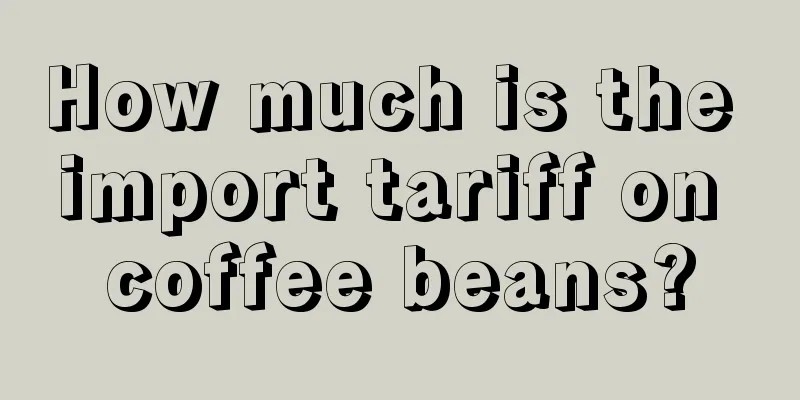How much is the import tariff on coffee beans?

Background on coffee bean import tariffsWith the development of the global economy and the increase in international trade, coffee beans, as an important agricultural product, have been widely planted and consumed around the world. However, there are differences in the tariffs imposed by different countries on the import of coffee beans. This article will focus on the import tariffs of coffee beans and explore the tariffs imposed by different countries on this commodity. US imposes tariffs on coffee beansAs one of the world's largest consumer markets, the United States has corresponding import tariff policies for various commodities. In terms of coffee beans, according to data released by the U.S. Customs and Border Protection (CBP), in 2019, the United States imposed a minimum base price of $1.40 per kilogram (kg) or 7% on green unroasted or lightly roasted coffee beans imported from non-free trade partner regions (such as Brazil, Colombia, etc.). EU imposes import tariffs on coffee beansThe European Union is one of the world's largest coffee importers, and its import tariff policy on coffee beans has also attracted much attention. According to data released by the European Commission, in 2020, the EU imposed a 7.5% tariff on green unroasted or lightly roasted coffee beans imported from non-free trade partner regions (such as Brazil, Colombia, etc.). China imposes import tariffs on coffee beansAs an emerging consumer market, China's demand for coffee has continued to increase in recent years. According to data released by the General Administration of Customs of China, in 2021, China will impose a 15% tariff on green unroasted or lightly roasted coffee beans imported from non-free trade partner regions (such as Brazil, Colombia, etc.). Other countries/regions impose import tariffs on coffee beansIn addition to the United States, the European Union and China, other countries/regions also have their own different coffee bean import tariff policies. For example, Japan will impose an 8.5% tariff on unprocessed coffee beans imported from non-free trade partner regions (such as Brazil, Colombia, etc.) in 2021; Australia will impose a 5% tariff on green unroasted or lightly roasted coffee beans imported from non-free trade partner regions (such as Brazil, Colombia, etc.) in 2020. The impact of import tariffs on coffee beansThe tariffs imposed by different countries on coffee bean imports directly affect the price and competitiveness of the commodity in the international market. Higher import tariffs will increase the cost of coffee beans, causing the price of the final product to rise, thereby reducing consumers' willingness to buy. In addition, the differentiated import tariff policies between different countries may also lead to trade barriers and unfair competition. in conclusionIn summary, there are certain differences in the tariffs imposed by various countries/regions around the world on the import of coffee beans. The United States, the European Union, China and some other major consumer markets have corresponding policies to regulate the circulation of this commodity. Understanding and analyzing these policies is of great significance to related industries and consumers, and helps promote the development and cooperation of international trade. |
<<: Inventory of coffee bean varieties with a sour taste
>>: Coffee bean grinding: the perfect transition from beans to powder
Recommend
Sprinkler coffee: a new way to brew coffee
A new way to brew coffee: using a spray pot Coffe...
How to make coffee from coffee beans
Explore the various flavors of coffee beans and t...
A cup of black coffee on an empty stomach in the morning: pros and cons
Drinking a cup of black coffee on an empty stomac...
Manner Coffee: Taste elegance and enjoy gentleman style
introduction MANNER coffee is centered around tas...
What causes frequent insomnia? Find out these reasons
Most people feel scared when talking about insomni...
How to choose the best coffee beans for you? Detailed analysis of coffee bean types and selection tips
How to choose the best coffee beans for you? Deta...
Choose the most cost-effective coffee beans and enjoy economic benefits and delicious taste!
Coffee beans are a popular beverage ingredient, a...
Barista Qualification Examination Center, do you know where to take the exam?
Barista Qualification Examination Center The Bari...
What are the top ten coffee beans?
Coffee beans: the heart of global coffee culture ...
Picasso coffee machine is not a random brand. In-depth analysis of the value and status of the Picasso brand
Picasso coffee machine is not a common brand, it ...
Iced Americano coffee beans: center-grinded for a cool, refreshing taste
Iced Americano coffee beans: center-grinded for a...
How to get coffee beans in Plants vs. Zombies
Explore the gaming value and charm of coffee bean...
No need to grind coffee beans, just brew them directly
introduction Coffee is a must-have drink for many...
Drinking coffee for the elderly has both benefits and risks
Drinking coffee has both benefits and risks for t...
The Secret of 1-shot Coffee Powder: The Secret Formula for Perfect Taste
Discover the perfect taste formula of coffee 1SHO...









